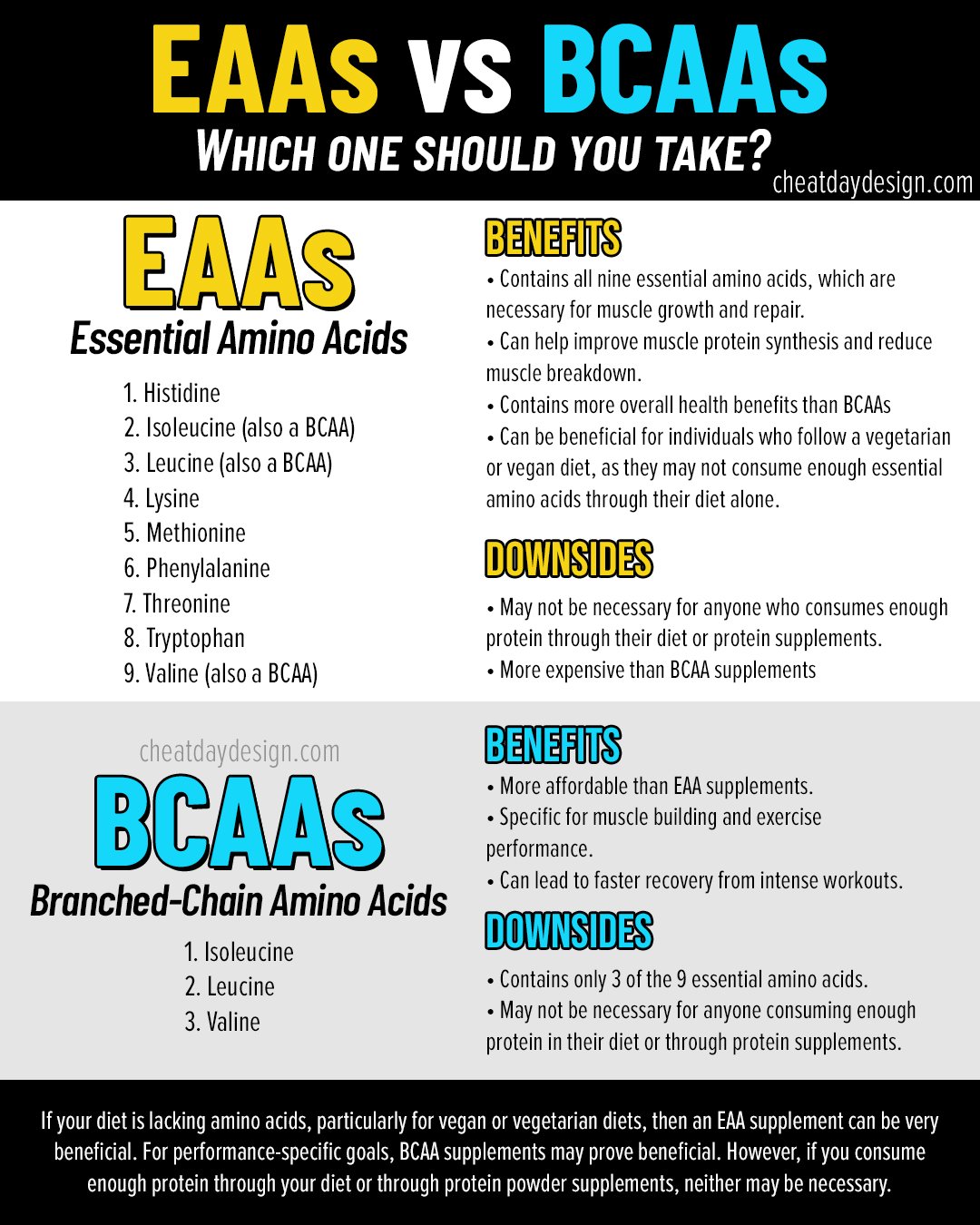The information presented in this article is for educational purposes only and is not intended to serve as medical advice. Always consult with a healthcare professional or nutritionist before starting a new supplement regimen, especially if you have any pre-existing health conditions or concerns. Pregnant or breastfeeding women and individuals with kidney or liver disease should exercise caution when considering EAA or BCAA supplementation.
If you’re new to the world of supplements, you might have seen amino acid supplements and had no idea what they were. Most notably, BCAA and EAA supplements.
These supplements are touted by many fitness professionals and influencers to increase muscle growth, recovery, and overall athletic performance, so it might feel like you need to get one for yourself.
But what exactly are EAAs and BCAAs, and which one should you be taking? In this blog post, I’m going to help you figure that out.
We’ll explore the differences between these two types of supplements and help you decide which one is right for your needs (if any) because there’s no such thing as a one-size-fits-all supplement.
Why Take Amino Acid Supplements?

We need all 20 amino acids to build protein, but the nine essential amino acids (EAAs) are particularly important because they cannot be produced by the body and must be obtained through the diet instead
When you don’t get enough of these amino acids, it can make it much more difficult to build muscle and can end up impairing your overall health.
While a balanced diet can provide all the necessary amino acids, certain diets or dietary restrictions can make it difficult to get enough amino acids. Vegetarians, vegans, and those following a low-calorie or low-protein diet, for example, may struggle to meet their amino acid requirements.
In those cases, EAA or BCAA supplements can be extremely beneficial.
On the other hand, individuals who consume enough protein in their diet or who take protein powder supplements containing all the essential amino acids likely don’t need supplements. Many people in the fitness space are taking both an amino acid supplement and a protein supplement, but that’s likely not necessary.
The main reason anyone would take an amino acid supplement is for muscle growth and muscle repair. Amino acids stimulate protein synthesis and prevent muscle protein breakdown, making them essential for building and maintaining lean muscle mass.
While non-essential amino acids will help with overall health (gut health, immune health, etc), essential amino acids are the backbone of muscle building, so many people choose to lean on these supplements.
Benefits of Amino Acids While Fasting

There is some evidence to suggest that EAA (essential amino acid) and BCAA (branched-chain amino acid) supplements may be beneficial during prolonged fasting periods, like intermittent fasting.
When you fast for an extended period, your body enters a state of catabolism, which means it starts breaking down muscle tissue for energy. This process can result in muscle loss and a decrease in overall metabolic rate over a long enough period of time.
However, supplementing with EAA or BCAA during fasting may help to mitigate muscle loss and improve muscle protein synthesis (how your body builds and repairs muscle tissue).
The amino acid Leucine has been shown to stimulate muscle protein synthesis, making it a particularly valuable amino acid for those looking to preserve muscle mass during fasting periods. BCAA supplements have been shown to reduce muscle breakdown and improve recovery from exercise, but their effectiveness during prolonged fasting periods is less clear.
It is important to note, however, that consuming EAA or BCAA supplements alone during fasting periods is not a substitute for proper nutrition and should not be relied upon as a sole source of nutrients. It is still crucial to consume a balanced diet rich in high-quality protein sources, vitamins, and minerals on a regular basis to support overall health and well-being.
What Are Essential Amino Acids (EAAs)?

Amino acids are often referred to as the building blocks of protein. There are 20 different amino acids that the human body uses to build proteins, and 9 of these are considered essential amino acids (EAAs).
EAAs cannot be produced by the body and must be obtained through our diet. EAA supplements provide all 9 essential amino acids, which play important roles in various bodily functions, most notably in muscle growth and repair.
The 9 Essential Amino Acids
- Histidine
- Isoleucine (also a BCAA)
- Leucine (also a BCAA)
- Lysine
- Methionine
- Phenylalanine
- Threonine
- Tryptophan
- Valine (also a BCAA)
Benefits of EAA Supplements
- Muscle growth and repair: EAAs are crucial for building and repairing muscle tissue. They help stimulate the synthesis of new proteins and prevent muscle breakdown, which is essential for building muscle and maintaining lean muscle mass. EAAs also play a role in regulating anabolic rates, which can further support muscle growth.
- Improved endurance and reduced fatigue: EAAs can help improve energy levels and reduce fatigue during physical exercise, allowing you to work out longer and harder. They also support the production of energy in the body (ATP) by helping with various metabolic processes.
- Enhanced immune function: EAAs play a vital role in supporting the immune system, which is important for overall health and recovery from intense workouts. They contribute to the production of antibodies and other immune cells, helping to protect the body from infections and illnesses.
- Better absorption of dietary protein: EAA supplements can help improve the absorption of dietary protein, ensuring that your body is getting the most out of the protein you consume. This can be particularly beneficial for individuals following a plant-based diet, as plant proteins are often less bioavailable than animal proteins (in other words, they don’t absorb quite as well).
What are Branched-Chain Amino Acids (BCAAs)?

Branched-chain amino acids (BCAAs) are actually included in EAAs- they are leucine, isoleucine, and valine.
BCAA supplements focus specifically on these three amino acids, which are known for their role in muscle growth and recovery. BCAAs are unique among amino acids because they can be metabolized directly in the skeletal muscle, rather than the liver, which provides a much quicker source of energy. This makes BCAAs a preferred choice for anyone performing long, intense workouts.
Benefits of BCAA Supplements
- Muscle growth and repair: Like EAAs, BCAAs are essential for building and repairing muscle tissue. They help stimulate protein synthesis and prevent muscle breakdown. Leucine, in particular, is known for its strong anabolic effect, making it a key part of muscle growth.
- Reduced muscle soreness and faster recovery: BCAAs have been shown to reduce muscle soreness and speed up recovery time after workouts, allowing you to get back to the gym sooner. They can help decrease muscle damage and inflammation, promoting faster healing and less discomfort.
- Improved exercise performance: BCAAs can help improve athletic performance by providing energy and reducing fatigue during workouts. They can also help maintain muscle glycogen stores, which are the primary source of energy during long high-intensity exercise.
- Increased mental focus: BCAAs may help improve mental focus and reduce mental fatigue during exercise, allowing you to stay focused and maintain a strong mind-muscle connection throughout your workout.
EAA vs. BCAA: Key Differences
EAA and BCAA seem quite similar, so what are the major differences?
The main difference between EAA and BCAA supplements is that EAAs provide a more comprehensive amino acid profile, while BCAAs focus specifically on the three branched-chain amino acids. Both types of supplements can support muscle growth and recovery, but EAAs offer additional benefits thanks to their broader range of amino acids.
BCAAs primarily focus on muscle growth and recovery: While both EAAs and BCAAs can support muscle growth and recovery, BCAAs are particularly well-known for their muscle-building properties.
EAA supplements contain an additional six essential amino acids that BCAAs lack, which all play important roles in various bodily functions. This makes EAA supplements a more well-rounded option for supporting overall health and athletic performance rather than simply focusing on muscle building.
Long story short: BCAA supplements are specifically targetted at muscle building and performance, while EAA supplements offer a more balanced approach to overall health PLUS the muscle-building benefits.
Which is Better: EAA or BCAA Supplements?

When deciding between EAA and BCAA supplements, it’s essential to consider your fitness goals, dietary restrictions, and budget. Both types of supplements can be effective for muscle growth and recovery, but EAAs tend to offer additional benefits due to their more comprehensive amino acid profile. Factors to consider when choosing a supplement for you:
- Fitness goals: If your primary goal is muscle growth and recovery, a BCAA supplement may be sufficient. However, if you’re looking to support overall health and athletic performance, an EAA supplement may be a better choice.
- Dietary restrictions: If you’re following a plant-based diet or have difficulty getting enough essential amino acids from food sources, an EAA supplement might be a better choice for you. On the other hand, if you’re primarily focused on muscle growth and recovery and already consume a balanced diet with adequate protein intake (especially if you already have a whey protein supplement), a BCAA supplement may be more than sufficient.
- Budget: EAA supplements tend to be more expensive than BCAA supplements due to their more comprehensive amino acid profile. If budget is a concern, you may want to opt for a BCAA supplement.
Pros and cons of EAA and BCAA supplements:
- EAA supplements:
- Pros: More comprehensive amino acid profile, supports overall health and athletic performance, provides all of the essential amino acids when diets are lacking (like a plant-based diet).
- Cons: More expensive, may not be necessary if you already consume a balanced diet with adequate protein intake.
- BCAA supplements:
- Pros: More affordable, specifically targets muscle growth and recovery, can provide quick energy during workouts.
- Cons: Less comprehensive amino acid profile, does not provide all of the essential amino acids, may already be provided in a protein shake or supplement.
How to Use Amino Acid Supplements
Regardless of the type of supplement you choose, here are some important tips for making the most of them.
Suggested dosages and timing
When using EAA or BCAA supplements, it’s important to follow the recommended dosages and timing. Most people recommend consuming a BCAA supplement during intense workouts to help them stay energized throughout their workout, but it depends on the length and intensity of those workouts.
To be perfectly honest, consuming amino acids during your workout is likely not necessary unless you are working out for hours on end. If you are spending an hour in the gym, even if your workout is rather intense, you don’t need to be consuming amino acids during your workout.
While you certainly can, you’ll receive the same benefits by taking your supplement immediately after your workout.
For BCAA supplements, a common dosage is 5-10 grams per serving, taken 1-3 times per day. For EAA supplements, the dosage may vary depending on the specific product and individual needs, but a general guideline is to consume 10-20 grams per serving, taken 1-3 times per day.
What to look for in an amino acid supplement

For BCAA supplements, a common ratio is 2:1:1 of leucine, isoleucine, and valine. This means that for every 2 grams of leucine, there is 1 gram each of isoleucine and valine. This ratio has been shown to be effective in promoting muscle protein synthesis and reducing muscle breakdown during exercise.
If it’s unclear whether or not you are getting the proper ratio, aim for a supplement that contains 5 grams of BCAAs.
This applies for EAA supplements as well. Serving sizes for EAA supplements will vary, but aim for a supplement that contains 5 grams of BCAA in addition to the rest of the nine essential amino acids.
Additionally, look for amino acid supplements that are third-party tested for purity and quality assurance to make sure you are getting your money’s worth.
Are you getting enough amino acids from your protein powder?
If you are currently consuming a protein powder supplement, there’s a good chance that the use of an amino acid supplement might be a complete waste of money for you.
Some protein powders, like whey protein, are considered complete proteins, meaning they contain all nine essential amino acids that the body cannot produce on its own. Other sources of protein, like plant-based protein powders, may be incomplete and may not contain all nine EAAs, so it depends on the type of protein you consume.
If you’re consuming a plant-based protein powder, an EAA supplement will be beneficial for you as you may not be getting all of the individual amino acids through your diet.
If you take a dairy-based protein powder, like whey protein or casein protein, be sure to look at the label to see the amino acid profile.

For example, I use PEScience protein powder, which is a blend of whey & casein protein. Right on the label, it shows that each scoop contains 10 grams of EAAs, with 5 grams of that being BCAAs. In that case, taking an amino acid supplement is completely unnecessary.
Now, the caveat here is that you might not consume protein powder every single day, in which case, a supplement may be beneficial for you. It completely depends on your lifestyle and your specific needs!
Can You Consume Too Many Amino Acids?
While consuming amino acids in moderate amounts is generally safe for most healthy individuals, consuming excessive amounts can lead to adverse effects. Although, it’s pretty unlikely.
The single biggest side effect of consuming too many amino acids is the effect it has on your wallet. Your body can only utilize so many amino acids, so if you are taking a supplement on top of a sufficient amount of amino acids in your diet, you’re just going to pee out all of the excess amino acids.
In other words: that’s some very expensive urine.
Conclusion

In conclusion, both EAA and BCAA supplements can definitely be beneficial for muscle growth, recovery, and overall athletic performance. Choosing the right one depends completely on your needs.
If your sole focus is muscle growth and performance, BCAAs may be a better option for you, especially if you want a cheaper supplement.
If you are not getting enough amino acids in your diet, which is often the case with plant-based diets, then EAAs may be better for you.
Although there are benefits to both, it’s important to note that these supplements are likely not very necessary in your diet. There’s not much downside to taking them, but many people consume whey protein AND an amino acid supplement, which is definitely not necessary. Protein powders often contain more than enough essential amino acids, so you may not need an extra supplement.
Either way, it comes down to preference. If you know you don’t need a supplement but want to take it anyway, then go for it!
Just understand what you are consuming and make the best choice for you.
And please remember to consult with a healthcare professional or nutritionist for personalized advice, and always combine supplements with a balanced diet and regular exercise for the best results.





